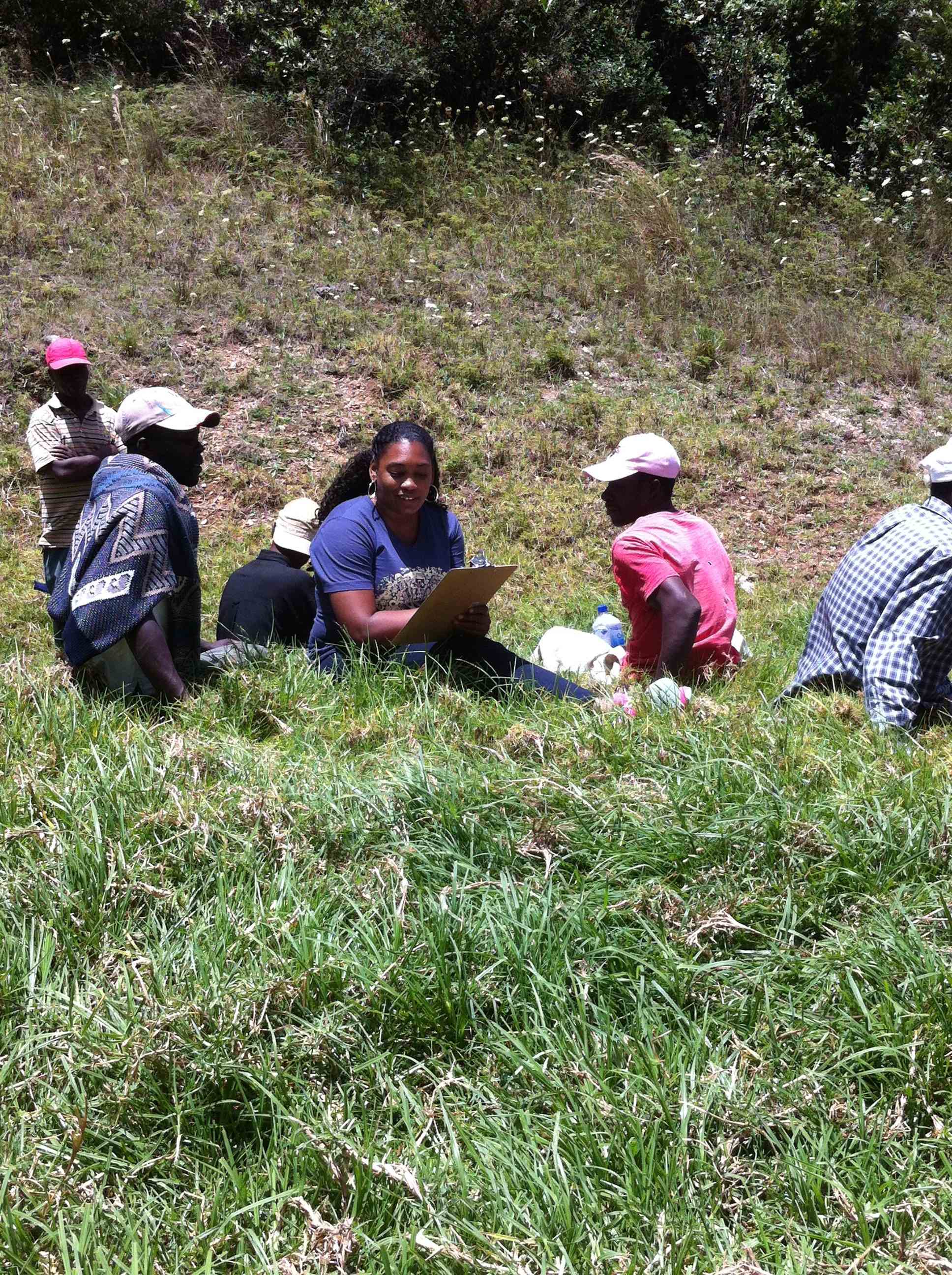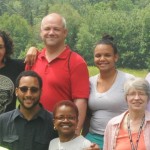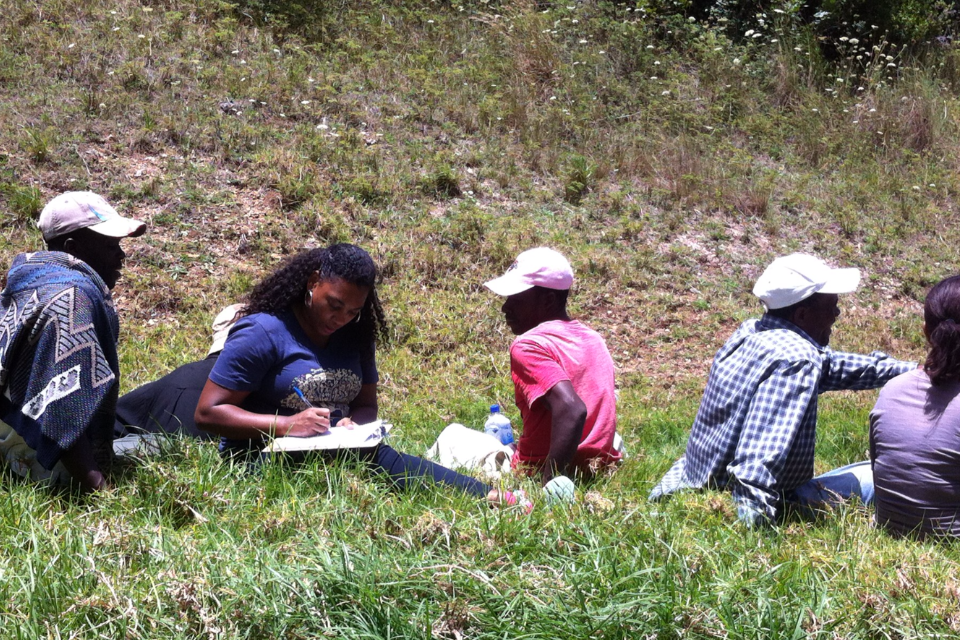Peace Literacy in Haiti: Notes from Rich Gorham
0December 16, 2014 by Tom McKenna

 by Rich Gorham (MA 01)
by Rich Gorham (MA 01)
Assistant Director, Andover Bread Loaf
Editor’s note: During late summer, 2014, a team of Andover Bread Loaf youth and educators traveled to Port au Prince, Haiti, to collaborate with Haitian educators for ABL’s fourth international conference. Below are excerpts from Rich Gorham’s detailed account of the experience. Read more about the event in Andover Bread Loaf’s Fall 2014 Newsletter. Photo credits to Brendan McGrath.
Day One: August 10, 2014
It’s 7 a.m. on Sunday, August 10, and I am in Port-au-Prince, Haiti, for the Fourth Bread Loaf International Conference (Karachi 2000, Dar-es-Salaam 2002, Nairobi 2009) . . . I am sharing a room with Brendan McGrath, a primary school teacher from Boston and a long-time Bread Loafer . . . Others who arrived yesterday were Mery Lizardo, a Lawrence High teacher, former student of mine and former ABLWW Writing Leader; Nate Baez, a Writing Leader, Lawrence High School grad, college student, and spoken word poet; and Elissa Salas, a Writing Leader and photographer who just graduated from Lawrence High School in June. Two have been here since Wednesday: Ummi Modeste, a teacher from Brooklyn, New York, and fellow ABL Director, and Ceci Lewis, a teacher, doctoral student and fellow ABL Director from Sierra Vista, Arizona. Both Ummi and Ceci are brilliant teachers and scholars. Ummi worked with me at the Dar and Nairobi conferences. Brendan and Ceci were also at the Nairobi conference. Today we will welcome Marquis Victor, the artist from Lawrence (co-director of Elevated Thought Foundation); Lisa Rahilly, an elementary school teacher from Springfield, Massachusetts, who did ABL this summer; and Ashley Jones, a documentary filmmaker and Bread Loaf 2013 graduate from Students at the Center in New Orleans.
We are working with our Bread Loaf teachers here in Haiti. The brilliant, energetic Chantal Kenors is the driving force behind the conference. She spent this summer studying at Bread Loaf Vermont and just got back to Haiti on Wednesday. She is the principal at the College Classique Feminin school and also teaches at the Bridge School, which will host the conference.
***
[F]or my students of Dominican heritage in Lawrence, Haiti is a complex and sometimes fearful place. Mery, Nate, and Elissa, the Writing Leaders who are on the trip, have already talked a great deal about what it means for Dominicans to visit Haiti, and I am eager to hear more from them. We had a good conversation at dinner last night about what they have already felt and experienced. At the risk of making errors as I speak for them, I will say that they are already in love with this gorgeous, culturally and geographically rich country, that they are startled at feeling like “the other” (to paraphrase Edward Said) on the island of Hispanola, and are extremely thoughtful in thinking about what we are doing here, and why. They are compassionate and loving people, whose political antennae are tuned in. Dixie and Lou have urged us to adopt Peace Literacy as a centerpiece of Bread Loaf’s international work.
We’ve been working in various countries for 25 years, starting with black South African teachers in 1989 while apartheid was still in full force and have always characterized our work as promoting literacy, liberatory pedagogy, and cultural understanding. It is time for us to acknowledge and embrace our role in promoting peace and make that our central goal.
****
Bread Loaf has no interest in coming to Haiti to tell Haitians what to do, or to make ourselves feel better. We are here to learn more than we are to teach. We do bring with us some expertise that we hope to share, but the goal of Bread Loaf is not to create a culture of dependency but a culture of independence. On one level this is the “train the trainer” model, but we hope to push that model further. Django Paris articulated a model of Culturally Sustaining Pedagogy that Dixie Goswami has urged us to push further into Culturally Productive Pedagogy. We are by definition collaborative.
Our workshops this week will be conducted collaboratively by a Haitian teacher and a United States teacher working together. We will learn from each other and hope to help build a sustainable Haitian Bread Loaf Teacher Network that will grow and evolve and serve the needs of Haitian teachers and students long into the future, one that we and others around the world can learn from. It will be rooted in the country, the community, and the people, not in Andover, Massachusetts, or Middlebury, Vermont.
The teachers we have met and worked with here are heroic. I do not mean that hyperbolically. Chantal is the principal at the CCF School, teaches one day at the Bridge School and volunteers as the curriculum director at another school that is financially unable to hire one. She runs a writer’s group and contributes to the intellectual life of the nation. She sponsors several students to attend school who cannot afford the fees . . . She is brilliant, compassionate, filled with energy and driven by a desire for social justice. Jean Laur Borgella, who attended ABL in the summer of 2013, has done stunning work. He travels all around the country to the most remote, least resourced areas to teach and train teachers. He is quiet, deferential, and extraordinary. Stories such as these seem to be common here, and in other places we have worked: Lee Krishnan in Mumbai, Mohsin Tejani in Karachi, Patricia Echessa-Kariuki in Nairobi, Jim Randalls and Kalamu ya Salaam in New Orleans come to mind. When the needs are great, great people accomplish great things. I hope to learn from them and others like them.
Day Two: August 11, 2014
ABL-Haiti’s goals are to build the Haiti Bread Loaf Teacher Network, strengthen the International Bread Loaf Teacher Network, build capacity among all participants to serve our students more effectively, develop models for teaching and learning that can be duplicated, share experiences of teaching and learning from across the world, (re) ignite our passions for and commitment to the important work of education, and celebrate the rich and vibrant culture of Haiti while recognizing challenges .
Chantal led us through the schedule. We changed some sessions, brainstormed ideas, and discussed each of the workshops. Ummi plans to do a writing prompt in the plenary sessions using an “I hope . . .” prompt. We discussed the different meanings of Kreyol terms this might translate into: Mwen ta renmen = I would like, but it won’t really happen; Mwean ta vlen = I want, and I think it can happen. Language is a complicated thing in all cases, and particularly in Haiti, where the language of instruction is often French, the language of conversation in Kreyol, and the language of commerce or international affairs is English. What I learned on Sunday is that (unsurprisingly) Kreyol is itself a mutable languge, evolving over time. This came up particularly when we discussed the Kreyol word for a particular kind of Haitian bread-treat. Since the name of our parent organization is “Bread Loaf,” we like to find an appropriate bread-related term to describe our work in each site. For example, the day-care center at Bread Loaf Vermont is “Croutons” and the daily newsletter is “The Crumb.” In Alaska the newsletter was “The Sourdough,” and in Oxford it is “The Paniculum.” In New Orleans it’s “The Beignets,” and so, we (well, the Kreyol speakers among us) had an extended discussion on the proper spelling and pronunciation of “Biswuit” or “Biskwit” or “Biskuit.” The differences are generational, location specific, and cultural. We have not yet come to resolution.
The teacher conference will take place Monday through Wednesday. The sessions will include the plenary session on Monday morning, Moving Away From the Banking Model, Expressing Identity, Connecting Our Classrooms, Parent Involvement, Connecting Haiti and the World, Mural-making, Food Literacy, Digital Literacy, and Positive Discipline. We will also have panel discussions on Understanding the Haitian Educational System and on Haitian Literature, and evening events: Mapping Haitian History, Centre Culturel Baton & Drum performance, and a visit to a Vodou Temple.
Day Three: August 12, 2014
“Bon jour!” cried Chantal at 9:21 a.m. on Monday morning, greeting the room filled with 34 educators from the U.S. and Haiti, officially launching the ABL-Haiti conference. (We would grow to nearly 40 by the end of the day). It was an exciting moment, particularly for those who have been dreaming and planning this conference for the last several years. Speaking Kreyol (one of two official languages of Haiti), Chantal welcomed all the participants and then introduced me. Speaking in English, I thanked our hosts for welcoming the visitors from the U.S., briefly explained what this funny name Bread Loaf means, and discussed the history of BLTN and our work in other sites, including Lawrence, New York, and New Orleans in the U.S. and Mumbai, Nairobi, Karachi and Capetown internationally. I thanked our inspirations and supporters, including the Abbot Academy Foundation. I explained our hope that by building a network of outstanding educators from around the world, we can do great things and explained our commitment to Peace Literacy. I then outlined some basic principles that guide our work: 1.You are the expert in the your classroom, and we are not here to tell you what to do, but to share what we have learned; 2.Everything we do is free and open, and we hope you will adapt what you learn and bring it back to your classrooms; and 3.We respect and honor all cultures and languages.
After I spoke, Chantal took over again and this time spoke in French. She asked each participant to briefly introduce himself or herself and explain his or her work. Participants proudly introduced themselves as members of the new ABL-Haiti Network.
Throughout all of this, Tatiana Behrmann seamlessly translated among three languages: English, French and Kreyol. (She is very, very good at this). When it was Ummi’s turn to introduce herself, she spoke in English and in American Sign Language. Later on in the morning, Florence wrote a poem in Spanish, so by noon on the first day, the conference had used no fewer than five languages.
Day Five: August 14, 2014
“I realized why I am in teaching, and why I chose middle school.” These are the words of Fabienne Rosseau at the conclusion of the 2014 ABL-Haiti Teacher Conference on Wednesday afternoon. Ceci asked us to think about what we will bring back to our classrooms based on what we learned in the conference. We wrote for five minutes, and then everyone shared.
Here is some of what I was able to capture. Nelson said, “I want to give [my students] the opportunity to write in a liberatory way.” Max said that he will “use the writing prompts to get students to express themselves.” Ashley said she plans to help students collaborate to write a combined New Orleans-Haiti history book. One participant said, “All of the workshops had a common theme: Make everyone part of it. We have a created a world in which everyone can make a difference.” Another said, “I work with students with learning disabilities . . each child is unique . . . without love they will not learn.” Stephanie plans to bring the Elevated Thought model to Haitian orphanages. Brendan will bring a new understanding of Haitian culture and history to his third grade class in Boston, which serves many Haitian-Americans. Florence will use what she learned from the Expressing Identity workshop with young adults in her Spanish class (in Haiti), asking students to write in French and Spanish: “I will help students know who they are, where they are from, and where they want to go.” Jean-Laur will bring the Wall of Wishes to his classroom at Bridge Academy. Nate will bring what he learned in Ashley’s Digital Media workshop to the Lawrence YMCA to help students make films based on poetry. Mery hopes to “help students find the joy of being curious in learning.” Marquis plans to develop a course based on Mosi’s workshop: studying the Haitian revolution and helping students develop art and poetry.
Day Six: August 16, 2014
And so it came to be that 40 ABL teachers and students were sitting on a ridge on the side of the mountain in the Wynne Ecological Reserve, overlooking the valley just west of Port-au-Prince, participating in art and writing workshops led by Marquis Victor and Nate Baez. Several men who worked on the farm who had helped us plant the trees sat nearby, observing what we were doing. When asked if they would like to participate in the writing workshop, one said “yes” and jumped right in. Another, a man in his fifties, said, in Kreyol, “I would like to, but I do not know how to write.” Frederika Duval, one of our teachers, gently offered to serve as his translator and scribe. He accepted eagerly and wrote about how he saw nature. When he finished, he shared his words with the group: “I see trees and I see life. I see trees as life because trees provide water. I am very proud because I have been working here for twenty years.”
Day 7: August 17, 2014
“Kelkeswa san men ou jwenn fe, fe, l ak tout nanm ou” —Klezyas 9:10 “Whatever you find to do with your hands, do it with your soul” — Ecclesiastes 9:10
These are the words (in Kreyol) posted on the wall of the Henri Christophe School in Darbonne, Leogane, that we visited on Friday morning. Situated in a rural area southwest of Port-au-Prince, the school serves 170 students ages 4-12 with 8 teachers. Fees are $27 a year, supplemented by funding from local donors and the non-profit group Haiti Partners. Benaja Antoine, a man of great intellect and love, works for Haiti Partners in coordinating the social businesses that support the schools and provides professional development for teachers. The school’s building was destroyed in the 2010 earthquake, and when people tried to rebuild, there were issues with the land. A local resident so believed in the school that he donated land on his own property, and a new facility has been built. We met with the donor and the principal and toured the classrooms and computer lab, which has five computers. The passion of the people from the community who support this school is evident. The teachers come from the local community and have been working with the school for a long time. Some of them do not have the certifications required by the government; Benaja and some volunteers are working with them to help them get certified.
Category BLTN Global, BLTN International, Fall 2014 | Tags:














Leave a Reply